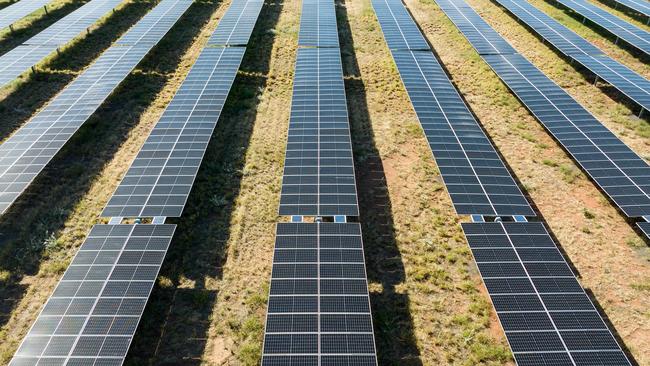Energy players air concerns over Crisafulli government’s reforms for renewables projects
The energy industry is concerned about the suitability of the Crisafulli government’s renewable energy reforms, fearing additional red tape and council interference will affect project viability.

The energy industry has raised concerns about the suitability of the Queensland government’s renewable energy reforms, fearing additional red tape and council interference will affect project viability.
While the industry’s peak bodies supported the reforms in principle, both Australian Energy Producers and the Association of Mining and Exploration Companies have called for key changes and further consultation.
The laws would require companies proposing renewables projects to consult with local communities and through a Social Impact Assessment, and broker an agreement with the local council on community benefits before lodging an application, which the industry says will add onerous cost and time.
Deputy Premier Jarrod Bleijie said developers need to have greater consideration of regional and rural communities.
“Our laws will pass parliament in a few weeks’ time, which puts community at the heart of these decisions,” Mr Bleijie said this week.
“What it will mean is any developer, whether you’re … a miner or you’re a farmer or in agriculture, if you want to develop a wind farm in regional Queensland, you’ve got to take community on a journey.”
The airing of concerns has coincided with several major energy announcements in recent days. Mr Bleijie axed a $1bn wind farm project at Moonlight Range, 40km north of Rockhampton, using extraordinary planning powers after 85 per cent of the community rejected the approved plan.
Just days later, the government announced nine new sites would be released for gas exploration, the majority of which will not require reserves for domestic use.
AEP, which wrapped up its four-day conference in Brisbane on Thursday, said it is “regrettable” the industry was not consulted on the reforms, which it claims were built on untested assumptions without thought of how the changes would be applied.
It argued the council should not be made the arbitrator of “technical and complex” projects.
“Some local councils may lack the technical expertise and regulatory resources required to assess the complex considerations involved in large project applications,” its submission said.
“This shift could lead to inconsistent or overly cautious decisions rather than balanced, evidence-based evaluations aligned with state and national energy strategies.”
AMEC has called for large-scale solar and wind projects to be subject to similar approvals frameworks as mining projects, and creates an extra level of red tape given current environmental assessments already cover similar ground required by the changes.
“The layering of community consultation and land access processes is increasing stakeholder fatigue and friction,” the submission said.
“Projects between sectors share common stakeholders, such as landowners, traditional owner groups and host communities.
“The last 50 years of environmental assessment practices in Australia are being overlooked in favour of a new, inconsistent framework.”
In separate submissions, power firms Squadron Energy and Ark Energy said the amendments were unclear and would be at odds with policy to delivering renewables.
“The amendments in their current form are unclear and will create unnecessary risks, and are likely to add significant costs and delays to the lodgement of DAs,” Ark wrote.
“This will detract from the collective desire for timely delivery of optimal benefit programs to host communities through renewable energy developments.”
Mr Bleijie originally paused the Moonlight Range project alongside three other wind farm proposals for further consideration. The other projects have each been un-paused and, of those, two were approved to proceed.
The bill also contains legislation that overhauls planning laws to make all venues for the 2032 Olympics approved by the government “legal” and not subject to any court challenges. The changes, if passed, would stamp out opposition to the Crisafulli government’s centrepiece $3.2bn inner-city stadium at Victoria Park, which has vocal and high-profile opposition.







To join the conversation, please log in. Don't have an account? Register
Join the conversation, you are commenting as Logout